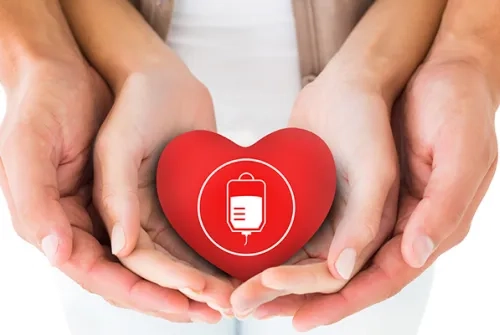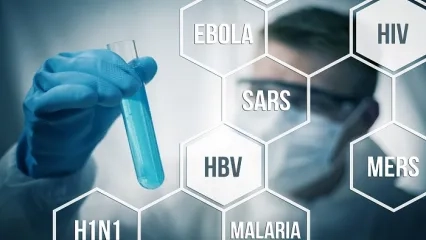Alo Yeditepe
Alo Yeditepe
Approximately 3 Million Patients Need Blood Transfusions Every Year in Turkey
Yeditepe University Hospitals Infectious Diseases and Clinical Microbiology Specialist Prof. Dr. Meral Sönmezoğlu said, "In our country, approximately 3 million patients need blood transfusions every year."
Yeditepe University Hospitals Infectious Diseases Specialist Prof. Dr. Meral Sönmezoğlu stated that blood transfusions are performed every day to save the lives of many people around the world and that approximately 3 million patients need blood transfusions every year in Turkey. Prof. Dr. Sönmezoğlu stated that blood is a treatment substance that cannot be produced such as drugs or vaccines and whose only source is healthy people.
Blood donation is a unique way to help save someone's life. Prof. Dr. Sönmezoğlu: "Also, a blood donation can save three lives because different blood components are created that can help three different people.
Every day, blood transfusions are given to save the lives of many people around the world. In our country, approximately 3 million patients need blood transfusions every year. Blood donation provides the blood requirement required for the treatment of patients with cancer, bleeding disorders, cancer-related anemia, and other hereditary blood diseases and for patients to be operated on. That is why it is important to donate blood and help those in need. It is also possible to store your own blood for your future needs.”
Prof. Dr. Explaining that every healthy person between the ages of 18-65 and weighing over 50 kilograms can be a blood donor candidate, Sönmezoğlu remarked that those who will donate blood for the first time should not be older than 61 years old.
The people who will donate at the moment should not have a chronic disease, feel healthy, and donate without compulsion and expectation. The following information about the situations that prevent blood donation as follows:
"The first condition of blood donation is to feel very healthy on the day of donation and not to show symptoms of illness. While some genetic diseases may not interfere with blood donation, most diseases and medications are not suitable for blood donation. For this reason, questions about the drugs they use, and their health are asked orally to people who apply for blood donation, and an inquiry form containing the questions determined by the Ministry of Health in accordance with national and international legislation is also filled out. Signatures are obtained for the correctness of the answers given to these questions and the donor bears a legal obligation. The employees of the transfusion center explain these obligations to the donors."
"Blood Cells Renew with Blood Donation"
In accordance with the "Blood and Blood Products Law" and regulation issued in 2007, Sönmezoğlu stated that the authority to collect blood for the national blood supply is in the Turkish Red Crescent. Therefore, donations are collected by the Red Crescent blood donation centers and mobile donation teams. However, when the desired blood product is not available in the Red Crescent stocks, the hospital can authorize transfusion centers. In this case, donor candidates are directed to the hospital for donation.
The blood donation process is a legal process, therefore, their identity and contact information are recorded in the system used by the Turkish Red Crescent.
After donating blood, the organs that make blood become stimulated and start making blood. Blood cells are renewed. Knowing that it will save lives provides relief and gives peace of mind. Some tests are performed to donate blood, which may be beneficial for the person who has it. Since blood is given willingly, it is advantageous that there is no risk of blood diseases. In this case, a healthier recovery can be achieved because blood transfusion is provided in a healthy way. In order to give blood continuously, it is necessary to recover the blood for at least four months at a time. In this way, blood can be given even 4 times a year.
Press Coverage: aa.com | haberturk.com | yeniakit.com |
About
Faculty and Year of Graduation:
Medical Faculty of Ankara University, 1984
”
See Also
- What is Hepatitis B? What are its symptoms? How is it Transmitted?
- What is HMPV Virus? HMPV Symptoms and Ways of Transmission
- Why Is the Flu Lasting Longer This Year?
- What Precautions Should Be Taken Against the Cold Epidemic?
- Don't Be Late Fighting Against Diseases
- Antibiotics Kill Beneficial Bacteria, Not Viruses
- What is Hepatitis? What are the Symptoms and Treatment Methods?
- Symptoms and Treatment of Tick Bites
- Summer Infections
- Precautions Must Be Taken Against Loss of Life Due To Infection in Thalassemia
- Information on H1N1 (Swine Flu)
- Summer is Coming... Beware of food poisoning!
- Our Taboos Affect the Increase in the Number of HIV-Positive Cases in Turkey
- Strep A Symptoms and Treatment
- Do Not Put a Cigarette Butt or Pour Olive Oil or Liquid Soap on the Tick
- Reheat the Food You Cooked Only Once!
- HIV Can Be Hidden for 10 Years without Any Symptoms!
- 290 Million People Live Without Knowing They Have Hepatitis
- Things to Consider When Touching Meat at Eid
- What Is Anthrax Disease?
- The Way to Fight AIDS is to Raise Awareness First
- Still Not Too Late For Flu Vaccine
- What is Rhinovirus?
- Fighting with Thalassemia: Meral Yılmaz
- Thalassemia Spreads from the Mediterranean to the Whole of Europe with Migration!
- Early Treatment of Crimean Congo Hemorrhagic Fever is Vital
- When to Get the Flu Vaccine
- Antibiotics Account For 14% of Prescription Costs
- West Nile Virus Replaces Malaria
- It Is Necessary to Try to Be Healthy in order to Be Protected
- A New Flu Outbreak is Expected Every 10 Years
- 63% of Vector-Borne Diseases are Caused by Lyme Disease
- Experts Warn About Flu Risk
- Mosquito Infection Risk
- Why aren’t Antibiotics Working Any More?
- The World Raises an “Alarm” on Antibiotic Resistance!
- What is COVID-19?
- The Mask Requirement was Removed and the Importance of Social Distance Increased!
- How to Prevent COVID-19 in School-Going Children
- WHO (World Health Organization) Warns for Antibiotic Resistance!
- Who Is Threatened by Monkeypox?
- Ways to Prevent Coronavirus
- Swine Flu / H1N1
- Life Returns to Normal with Caution
- What is Monkeypox Virus? What Are the Symptoms of the Monkeypox Virus?
- What is Lyme Disease?
- How to Tell if You Have a Mild Coronavirus?
- Pay Attention to These Rules for COVID-19
- Hand Sanitizer Usage Guide
- The Priority Rule for the Protection from Summer Infections is Hygiene
Alo Yeditepe




